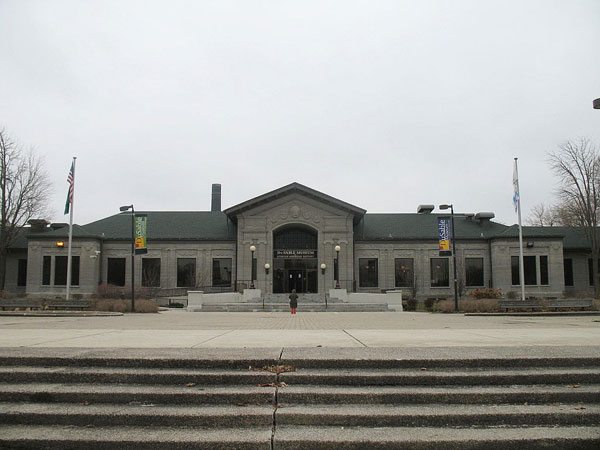
November 15, 2017; ColorLines
Although the Civil War was won by the Union 152 years ago, there are those who still fiercely battle to maintain the visibility of the Confederacy. The violent August 12, 2017 white nationalist rally in Charlottesville, North Carolina brought renewed attention to the dozens of Confederate monuments that still stand in the US today and sparked a dialogue about whether or not those monuments should continue to stand. To the chagrin of people who find pride in this history, many government officials ordered the removal of plaques, statues, and markers in an effort to de-celebrate Confederate icons.
Unsurprisingly, recent conversations about Confederate monuments have been loud, drowning out the other side of the story about the people and sites important to African American history. As a response to the discussion about Confederate monuments and to draw attention to overlooked African American counternarratives, the National Trust for Historic Preservation’s African American Cultural Heritage Action Fund has committed to raising $25 million to protect and preserve African American heritage sites. The Fund aims to tell “the full American story” and to shed light on the country’s difficult past for a more inclusive future.
The multi-year initiative will elevate African American activism and achievement to make a lasting contribution to America’s cultural landscape. Financed by the Ford, Open Society, and JPB Foundations, the project will memorialize sites that would have been forgotten to history. In fact, much of the first site to be restored, Shockoe Bottom, has already been paved over, despite its significance as the second largest slave marketplace in the country, after New Orleans. Another site slated for restoration is the Mountain View Black Officers’ Club at Fort Huachuca, Arizona, one of the only remaining World War II-era social clubs for Black military personnel. Both properties are in danger of demolition and are in dire need of repair.
Darren Walker, president of the Ford Foundation, will lead an advisory panel on the project. “We were concerned that the narrative around historical monuments and markers that was all about tearing things down,” says Walker. “While we think there is a role to play in determining what monuments should remain, we believe that it is equally as important to create monuments and markers for people whose stories have not been told.”
Sign up for our free newsletters
Subscribe to NPQ's newsletters to have our top stories delivered directly to your inbox.
By signing up, you agree to our privacy policy and terms of use, and to receive messages from NPQ and our partners.
Another member of the advisory panel is Lonnie Bunch, director of the Smithsonian National Museum of African American History and Culture. The only national museum devoted to African American life, history, and culture tells the American story through the African American lens. Since it opened in September 2016, the museum has seen over 3 million visitors. The museum, which hosts over 8,000 visitors per day, double the anticipated number, offers opportunities to view items exemplifying the struggles African Americans have faced throughout their history, including the glass-topped coffin brutally murdered Emmitt Till was buried in, child-sized slave shackles, and KKK robes. The museum sheds stark light on the inequities suffered by Black people throughout their American experience, from the degradation of slavery through the racism of today. While the museum houses artifacts from a shameful past, it was also recently a stark reminder that the struggle is far from over. In May, a noose was found in the museum, the second of three found on the National Mall. In a statement, Museum Director Lonnie Bunch said, “The noose has long represented a deplorable act of cowardice and depravity—a symbol of extreme violence for African Americans. Today’s incident is a painful reminder of the challenges that African Americans continue to face.”
Adding to the National Trust’s preservation of African American historical sites are other efforts to amplify African American voices in the conversation about America’s complex history. A recent NPQ article describes one artist’s newly erected monument, which stands in juxtaposition to the white narratives celebrated by Confederate statues. Artist Titus Kaphar’s new public sculpture is part of Princeton University’s “Princeton and Slavery Project.” Kaphar was enlisted to “create a monument that challenges the myths we tell about the founding of America.” The resulting sculpture is what Kaphar calls a “monument to the memory of the enslaved.”
Princeton joins the institutions celebrating African American achievements, contributions, and experiences, which have grown in number significantly in recent decades. Prior to 1950, there were only 30 museums devoted to African American culture and history. Today there are closer to 150. Among the first independent nonprofit museums to celebrate African American heritage is the DuSable Museum of African American History in Chicago, founded in 1960, which shares a mission to promote the achievements, contributions, and experiences of African Americans. Throughout its 50-year history, the DuSable Museum has provided educational and public programs designed to interpret and illuminate the lives and experiences of people of the African Diaspora for audiences of all ages.
While there is still a long way to go, the National Trust and others are working to shine light on the all too often overlooked African American experience so that the future is more inclusive than our history books have been.—Mi Lovejoy













